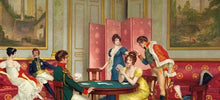
Card Games in Jane Austen’s World: Regency Pastimes That Revealed Character and Courtship
, by Global Mind Advertising, 5 min reading time

, by Global Mind Advertising, 5 min reading time
Explore the fascinating world of Regency card games featured in Jane Austen's novels. From Whist to Speculation, these games reveal character, culture, and courtship—and now inspire our vintage washi tapes and journaling supplies.

Card games were far more than casual entertainment in the Regency era—they were a window into social norms, personality traits, and courtship rituals. In Jane Austen’s novels, card games serve both as background ambiance and as critical narrative tools, offering insights into character development and the rigid social structure of the time.
According to Dr. Bates (PhD in 18th-century British literature from Emory University), Austen uses card games to mirror the structured and rule-bound society of the early 19th century. These games were governed by codified rules, mirroring the behavioral expectations of polite society—predictable, restrained, and rarely surprising.
Characters who played freely were often expressive and socially bold, while those who avoided games tended to be reserved or cautious. For instance:
Mr. Darcy’s avoidance of games reflects his introversion and guarded nature.
Lydia Bennet’s enthusiasm for gambling games like Lottery Tickets reveals her impulsive, risk-taking personality.
Card games also offered rare social opportunities for interaction between young people, making them an essential part of Regency courtship rituals.
Here is a brief guide on some popular Regency era card games courtesy of The Jane Austen Summer Program (Jane Austen Summer Program | Chapel Hill, NC)
What it is: The 19th-century version of bridge, played in teams of two. No bidding—just trick-taking.
Austen Mentions:
Emma: “Mr. Elton was actually on his road to London…though it was the whist-club night...”
Letters: “As soon as a Whist party was formed…I made my Mother an excuse, and came away.”
What it is: French for 21; a fast-paced game trying not to exceed a card total of 21.
Austen Mentions:
The Watsons: “You would be astonished to hear the noise we make there.”
Letters: “He acquitted himself to admiration in every particular except selling his Deals at Vingt-un.”
What it is: A trading game where players try to form the best three-card hand.
Austen Mentions:
Pride & Prejudice: “They both like Vingt-un better than Commerce...”
Letters: “There were two pools at Commerce…but I would not play more than one...”
What it is: A gambling game where players buy, sell, or trade cards hoping to land the highest.
Symbolism: This game is used metaphorically in Austen’s novels to reflect the “speculative” nature of marrying for wealth.
Austen Mentions:
Mansfield Park: “It was impossible for Fanny not to feel herself mistress of the rules of the game in three minutes.”
Letters: “I introduced speculation and it was so much approved...”
At sfwashi.com, we’ve woven these games and their symbolic meaning into our Jane Austen-inspired journaling supplies. Our vintage washi tapes, collage papers, and stationery ephemera reflect these elegant pastimes, letting you bring a touch of Austen’s Regency world into your creative projects.
Perfect for:
Junk Journals
Regency-themed Art
Vintage Scrapbooks
Mixed Media Collages
Literary Craft Projects

More resources
Characterization and Card Games in Pride and Prejudice
Excellently Qualified to Shine at a Round Game
Gambling, an Accepted Regency Pastime | Jane Austen's World